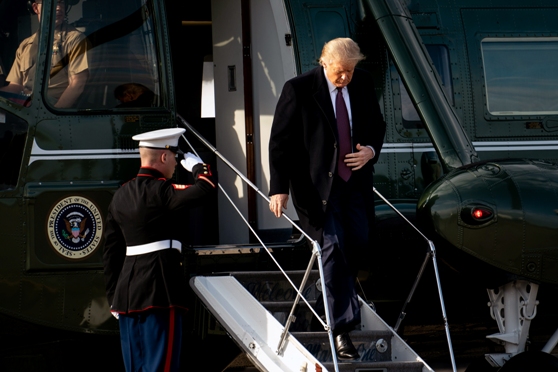By Matt Phillips and Eshe Nelson
NEW YORK– Stocks opened lower Friday (2) after President Donald Trump announced that he had contracted the coronavirus, a diagnosis that brought the global health crisis into the Oval Office, threatening to rattle the leadership of the world’s biggest economy.
The S&P 500 was down 0.6% in late morning trading, just hours after Trump said in a late-night Twitter post that he and the first lady, Melania Trump, had tested positive. The president was experiencing cold-like symptoms, according to two people familiar with his condition. Vice President Mike Pence and other officials have tested negative.
Trump’s announcement prompted investors to seek out safety assets such as the dollar and government bonds overnight, but as trading opened in New York they appeared to take the news in stride: The index recovered ground after opening down 1.4%.
“After an initial reaction the news is only likely to have a lasting market impact if it’s seen as influencing the election outcome or public health,” Paul Donovan, chief economist at UBS Global Wealth Management, said in note to clients.
Even with markets’ muted reaction, the announcement only added to the deep uncertainty already facing the economy: The pandemic has killed more than one million people around the world, and Trump has repeatedly suggested that the coming election was threatened by fraud and has refused to say whether he would accept the result.
“A close and contested outcome with a drawn-out period of rancour and instability would be bad news for markets,” said Trevor Greetham, a fund manager at Royal London Asset Management. “If anything, the president’s illness makes that more likely.”
Stocks have wobbled before because of presidential health. In September 1955, President Dwight D. Eisenhower had a heart attack, sending the S&P 500 down 6.6% in a day. Stocks fell 2.8% on Nov. 22, 1963, the day President John F. Kennedy was assassinated in Dallas. When President Ronald Reagan was shot on the afternoon of March 30, 1981, stock trading was halted, limiting losses to just 0.3%.
Perhaps the situation most similar to Trump’s is that of British Prime Minister Boris Johnson, who was diagnosed with COVID-19 in late March and was briefly hospitalized in intensive care.
On March 27, the day Johnson tested positive, the British stock market dropped more than 5% — but stocks around the world were also suffering deep declines. It was relatively early in the pandemic, and markets were highly volatile as countries locked down, imposed travel restrictions and tried to pass economic stimulus packages.
In Brazil, stocks fell about 1% in July on the day it was announced that President Jair Bolsonaro, a right-wing populist who had often dismissed the severity of the pandemic, tested positive.
Trump’s announcement — just over a month from Election Day, as he trails in most polls — came as stocks have lost steam after notching new highs in early September, a remarkable turnaround from the fall they experienced from the shutdowns of March.
Stock markets are historically weak in the month or so before a presidential election, as investors reduce their risk and wait for more clarity on who will hold power in Washington. This year, however, the typical investor angst about a change in the political winds is just one of the forces buffeting the economy and financial markets.
The country faces multiple crises arising from the ongoing pandemic. The deep recession it triggered shows signs of becoming more entrenched, with recent reports on the labour market showing a slowing recovery. On Friday, the Labour Department reported that employers brought back 661,000 jobs in September, nearly 200,000 fewer than economists had expected and well down from prior months. The economy created 1.5 million jobs in August, and 4.8 million in June.
Oil prices fell Friday as Brent crude, the international bench mark, was down nearly 4%, to $39.37 a barrel. West Texas Intermediate, the American standard, was also down about 4% to $37.18 a barrel. But the pressure on oil prices was only partly attributable to increased uncertainty about the U.S. election and Trump’s health, analysts said. Broader concerns about the global economy and oil demand are also contributing to the downward slide.
And talks on another round of federal spending to prop up households and businesses have stalled in Washington. Some analysts suggested the president’s diagnosis could generate something positive: an end to the standoff in Washington over further help to the economy.
“Markets could have some unexpected reactions as this could break the log jam in current stimulus negotiations,” Jamie Cox, managing partner for the Harris Financial Group, wrote in a note.
But the diagnosis represents another wild card involving Trump, whose pugnacious approach to global trade and domestic political negotiations have lately given way to even more unsettling statements.
Trump has suggested that he will be unwilling to abide by the results of any vote that favours his Democratic opponent, Joe Biden, who shared the debate stage with Trump on Tuesday (Sept 29).
“Now there’s increased uncertainty about the election because of the health of the candidates,” said Randy Watts, chief investment officer for O’Neil Global Advisors, a financial advisory firm. “And I think that gives investors a lot of reason to pause and not commit new capital to the market until we’re a lot closer to the election being over.”
-New York Times


